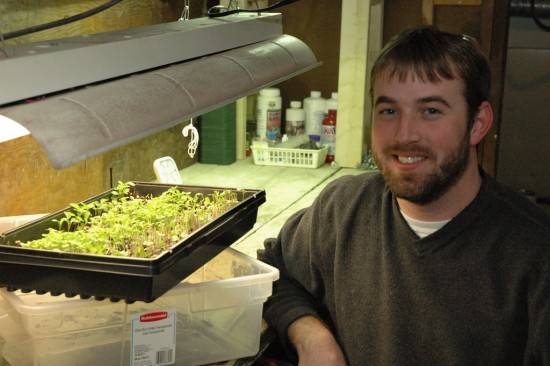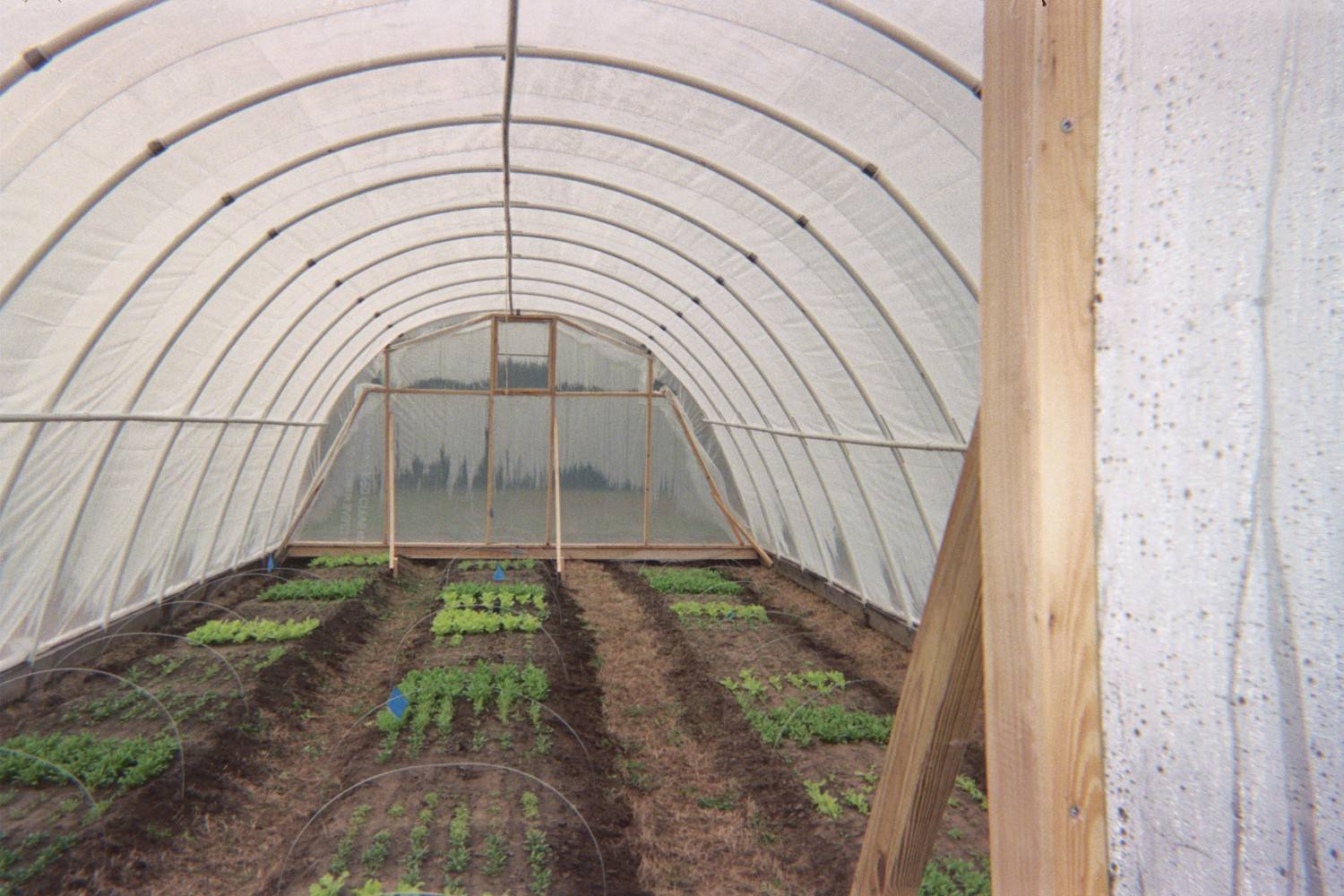
The University of Illinois owns thousands of acres of farmland, employs some of the brightest minds in the disciplines which focus on food production, spends millions to further our understanding of how plants grow, and is obligated to feed thousands of students each day in its dining halls. Not one of those students eats a single vegetable grown on local soil, or raised by their fellow students, staff, or community members. That’s about to change, and on a blustery morning last week (have there been any other kind lately?) I sat down to have coffee with the guy who’s going to help change it.
Zack Grant is an energetic guy who has clocked a fair amount of time growing vegetables in this area, including working at Henry’s farm in Congerville (just the other side of Bloomington.) He completed his Masters in Horticulture last summer, focusing on season extension through the use of “high tunnels” (unheated greenhouses, also called “hoophouses.”) Our conversation didn’t delve into the gritty growing details. Instead, it focused on a simple idea, posed by Grant as a question: “What better way to promote the sustainable management of resources than to provide students with locally grown produce?”

The idea of growing food on university land is not a new one. Long-time residents may remember that the University used to sell apples from its research labs. Professor Bruce Branham, interim head of the the Department of Natural Resources and Environmental Sciences (NRES) and the primary person responsible for the creation of the student farm, relates: “I was thinking of ways to generate income from our horticulture operations. You think you have a new idea, and it turns out people have been trying to do it for years. We used to operate apple sales, and that provided revenue which allowed us to keep extra farm crew. There were understandable objections from local farmers that felt this represented unfair competition, so these sales were stopped. I thought about growing food for our campus dining halls, partly as a way to avoid the issue of competition.”
Getting there is tougher than one might think. A few years ago, a group of folks tried something similar, entering into a dialogue with the University’s dining services in an attempt to have local farms provide some of the produce used in the residence halls. The talks broke down over price, quantity, and timing; the university buys a lot of food, buys it cheaply, and tends to not buy as much when local farms are producing the most. However, through coordination with Dawn Aubrey, senior assistant director of University Housing Dining Services, an arrangement has been made to allow the NRES student farm to sell exclusively and directly to individual residence halls, initially LAR, PAR, and FAR, and allowing the farm to increase its sales as it grows its operations. Dr. Michelle Wander, another NRES Associate Professor and Director of the Agroecology and Sustainable Agriculture Program (ASAP) at the university, was involved with the previous efforts to provide local produce to Dining Services. She states “Both ASAP and the Campus Sustainability Committee advocate this small venue approach. It will be interesting to see if/how this is handled if and when a student farm has any amount to sell consistently.”
The farm will operate on land near the corner of Windsor Rd. and Lincoln Ave., coincidentally close to the Meadowbrook Community Gardens managed by the Urbana Park District. Zack believes that engagement with the community will be an important part of the farm’s future, and notes “In times of recession, sustainable production and accessibility to food becomes a critical non-partisan issue for communities. Look at the victory gardens of the World War II era, which produced up to 40% of the vegetables being consumed nationally. It’s my hope that in the long term the farm can serve as a place for anyone to learn about growing vegetables on a small scale.” Professor Branham adds “We want to make it an outreach effort, so that school kids from the area can see a working vegetable farm.”
From a research perspective, the farm will help foster development of techniques in integrated pest management, cover cropping, season extension, and varietal testing, all of which may be of particular help to farmers in the surrounding area dealing with similar growing conditions. The methods will focus on “high-end sustainable” production, according to Grant, as well as Wes Jarrell, NRES Professor and former department head, who has also been instrumental in the creation of the farm. Jarrell described the approach as “not organically certified initially, but instead focusing on growing in a sustainable fashion where possible, with certifiable organic acreage to be added as the farm grows.”
So what will they grow? “High value crops like tomatoes, peppers, and greens initially, and we’ll be planting fruit trees that will be producing in a few years … we’d like to diversify more as the farm grows,” Grant said. That growth will depend in large part on the numbers of willing workers, as the farm will be mainly staffed with student volunteers. Funds from the “Sustainability Campus Environment Fee,” a $5/person fee assessed each semester and administered by the Student Sustainability Committee , will initially fund Grant’s position, but the rest of the labor will come from students wanting to take part in growing food. A partnership with Students for Environmental Concerns will help connect interested students with the farm.

Local organic vegetable farmer Jon Cherniss of Blue Moon Farms says that the long term viability of this model is dubious. “I view it like all the seeds that just arrived at my door. Ordering them was the easiest part. Seeding them in the greenhouse is pretty easy too, But after that … without proper care and attention, they will just wither and die. Often times student-run farms don’t do very well because the students are there for only four years. My concern is that the project won’t last without long term funding from University Administration. It is pretty hard to get a farm to succeed from grant to grant.” Eventually the farm should pay for itself, according to Grant, through its sales of produce to Dining Services: “Making the farm sustainable financially is important for the long term viability of the project, both in terms of weathering budget shortfalls and in providing a working example of making money farming.”
Beyond serving as an example, the farm could also provide internship opportunities in the future, for budding growers hoping to start their own farms. The Student Organic Farm at Michigan State University offers an Organic Farming Certificate Program which “provides both hands-on learning opportunities at the MSU Student Organic Farm together with classroom learning to prepare graduates for careers in organic farming.” Grant and the NRES professors involved see a program similar to that at MSU as a definite possibility at the NRES Student Farm.
Those active in the local food movement in our community are often working toward a sustainable food chain while simultaneously working around, behind, and in-spite-of an enormous land grant university founded “to teach such branches of learning as are related to agriculture … in order to promote the liberal and practical education of the industrial classes in the several pursuits and professions in life.” (Morrill Act of 1862.) These recent developments at NRES remind us that while large institutions move slowly, the outcomes of their eventual efforts can be of great benefit to their surrounding communities. I hope to catch up with Grant in the spring as the farm is breaking ground and planting, and have pictures and updates for Smile Politely readers at that time.








